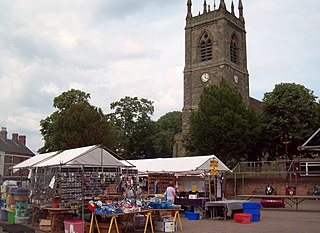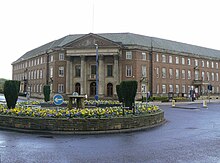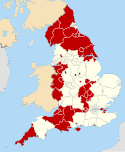
Amber Valley is a local government district with borough status in the east of Derbyshire, England, taking its name from the River Amber. Its council is based in Ripley. The district covers a semi-rural area lying to the north of the city of Derby. The district contains four main towns whose economy was based on coal mining and remains to some extent influenced by engineering, distribution and manufacturing, holding for instance the headquarters and production site of Thorntons confectionery.

East Staffordshire is a local government district with borough status in Staffordshire, England. The council is based in Burton upon Trent. The borough also contains the town of Uttoxeter and numerous villages and surrounding rural areas.

South Derbyshire is a local government district in Derbyshire, England. The district covers the towns of Melbourne and Swadlincote as well as numerous villages and hamlets such as Hilton, Hatton, Etwall, Aston-on-Trent, Repton, Weston-on-Trent and Willington. About a third of the National Forest lies within the district.

Erewash is a local government district with borough status in Derbyshire, England. The borough is named after the River Erewash. The council has offices in both the borough's towns of Ilkeston and Long Eaton. The borough also includes several villages and surrounding rural areas. Some of the built-up areas in the east of the borough form part of the Nottingham Urban Area.

Leicester City Council is a unitary authority responsible for local government in the city of Leicester, England. It consists of 54 councillors, representing 22 wards in the city, overseen by a directly elected mayor. It is currently controlled by the Labour Party and has been led by mayor Sir Peter Soulsby since 2011. The council also appoints a ceremonial Lord Mayor who chairs council meetings; the directly elected mayor is termed the City Mayor to distinguish the post from the Lord Mayor.

Nottingham City Council is the local authority for the city of Nottingham, in the ceremonial county of Nottinghamshire in the East Midlands region of England. Nottingham has had a council from medieval times, which has been reformed on numerous occasions. Since 1998 the council has been a unitary authority, being a district council which also performs the functions of a county council. Since 2024 the council has been a member of the East Midlands Combined County Authority.

Bristol City Council is the local authority for the city of Bristol, in South West England. Bristol has had a council from medieval times, which has been reformed on numerous occasions. Since 1996 the council has been a unitary authority, being a district council which also performs the functions of a county council. Bristol has also formed its own ceremonial county since 1996. Since 2017 the council has been a member of the West of England Combined Authority.

Derbyshire County Council is the upper-tier local authority for the non-metropolitan county of Derbyshire in England. The non-metropolitan county is smaller than the ceremonial county, which additionally includes Derby. The county council is based at County Hall in Matlock. Since 2017 the council has been under Conservative majority control. The council is a constituent member of the East Midlands Combined County Authority.

The Borough of Darlington is a local government district with borough status in County Durham, England. Since 1997 Darlington Borough Council has been a unitary authority, with both district-level and county-level functions; it is independent from Durham County Council. It is named after its largest settlement, the town of Darlington, where the council is based. The borough also includes a rural area surrounding the town which contains several villages. The population of the borough at the 2021 census was 107,800, of which over 86% (93,015) lived in the built-up area of Darlington itself.

The Borough of Hartlepool is a local government district with borough status in County Durham, England. Since 1996 Hartlepool Borough Council has been a unitary authority, which gives it both district-level and county-level functions; it is independent of Durham County Council. It is named after its largest settlement, Hartlepool, where the council is based. The borough also includes a rural area to the west of the town. The population of the borough at the 2021 census was 92,571, of which over 95% (87,995) lived in the built-up area of Hartlepool itself.

Peterborough City Council is the local authority for Peterborough, a local government district with city status in the ceremonial county of Cambridgeshire, England. Peterborough has had a council since 1874, which has been reformed several times. Since 1998 the council has been a unitary authority, being a district council which also performs the functions of a county council. Since 2017 the council has been a member of the Cambridgeshire and Peterborough Combined Authority.

Northumberland County Council is the local authority for the non-metropolitan county of Northumberland in North East England. Since 2009 it has been a unitary authority, having also taken over district-level functions when the county's districts were abolished.

Stoke-on-Trent City Council is the local authority of Stoke-on-Trent, Staffordshire, England. As a unitary authority, it has the combined powers of a county council and district council and is administratively separate from the rest of Staffordshire.

Nottinghamshire County Council is the upper-tier local authority for the non-metropolitan county of Nottinghamshire in England. It consists of 66 county councillors, elected from 56 electoral divisions every four years. The most recent election was held in 2021.

Durham County Council is the local authority which governs the non-metropolitan county of County Durham in North East England. Since 2009 it has been a unitary authority, having taken over district-level functions when the county's districts were abolished. The non-metropolitan county is smaller than the ceremonial county of County Durham, which additionally includes Darlington, Hartlepool and the parts of Stockton-on-Tees north of the River Tees. The county council has its headquarters at County Hall in Durham.

Plymouth City Council is the local authority for Plymouth, a unitary authority with city status in the ceremonial county of Devon, England.

City of York Council is the local authority for York, in Yorkshire, England. York has had a city council from medieval times, which has been reformed on numerous occasions. Since 1996 the council has been a unitary authority, performing both district-level and county-level functions. It is composed of 47 councillors and has been under Labour majority control since 2023. The council is based at West Offices on Station Rise. The council is a constituent member of the York and North Yorkshire Combined Authority.

Stockton-on-Tees Borough Council is the local authority of the Borough of Stockton-on-Tees, which straddles the ceremonial counties of County Durham and North Yorkshire in England. Since 1996 the council has been a unitary authority, providing both district-level and county-level services. It therefore provides services including Council Tax billing, libraries, social services, town planning, waste collection and disposal, and it is a local education authority. Since 2016 the council has been a member of the Tees Valley Combined Authority, which has been led by the directly elected Tees Valley Mayor since 2017.

Blackpool Council is the local authority of the Borough of Blackpool, Lancashire, England. It is a unitary authority, having the powers of a county council and district council combined.

The Borough of Chesterfield is a non-metropolitan district with borough status in Derbyshire, England. It is named after the town of Chesterfield, its largest settlement, and also contains the town of Staveley and the large village of Brimington.

























